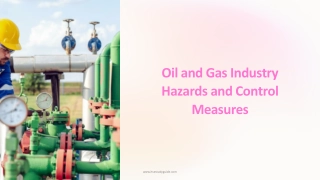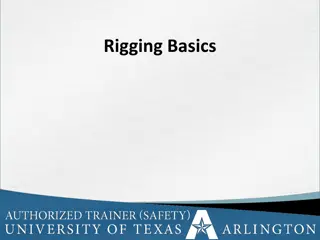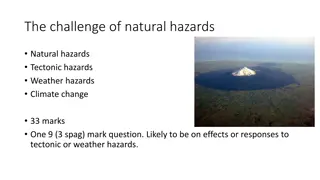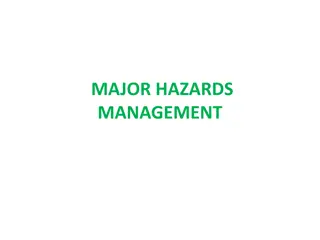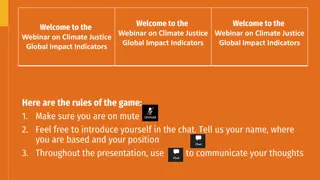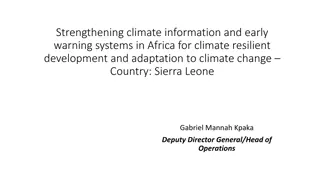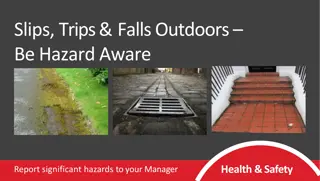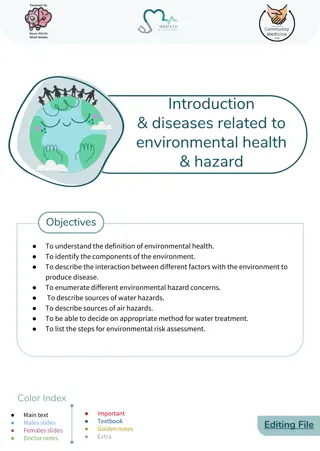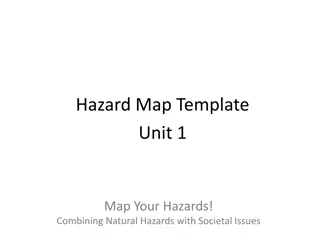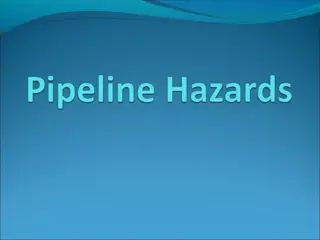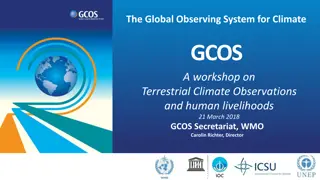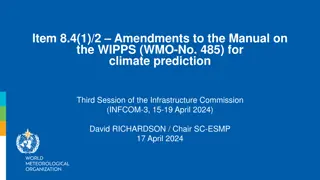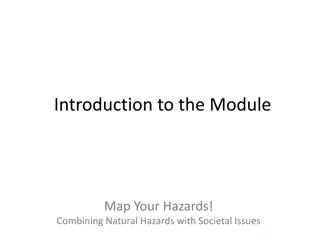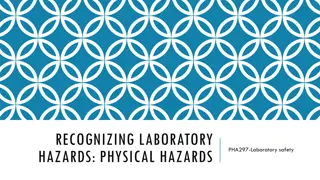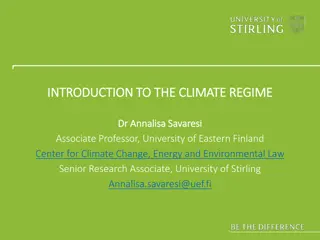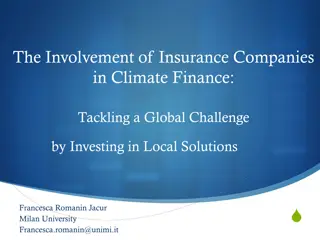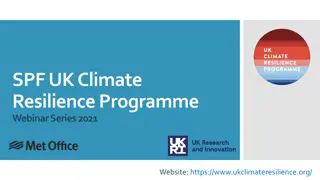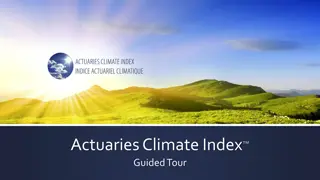Oil and Gas Industry Hazards and Control Measures
Learn to mitigate fire, explosion, exposure, physical hazards, falls, transportation risks, and natural hazards in the oil and gas sector. Effective control measures reduce risks and ensure worker safety. Explore key safety protocols.
1 views • 13 slides
Understanding Climate Change: Weather vs. Climate, Kppen-Geiger Classification, and Major Climate Zones
Explore the distinctions between weather and climate, delve into the Kppen-Geiger Climate Classification System, and discover major climate categories such as tropical climates. Gain insights into climate change and its impact on our environment.
8 views • 11 slides
A Student Exploration of the Global Impacts of Climate Change on Human Health
This research delves into the effects of climate change on human health, covering how a warming climate, changes in precipitation, and increased flooding frequencies impact various health aspects such as infectious diseases, nutrition, and mental health. The study provides a visual model illustratin
5 views • 17 slides
National Climate Change Bill Overview
The National Climate Change Bill aims to establish an effective response to climate change in South Africa, promoting a transition to a low-carbon, climate-resilient economy. It focuses on coordinated actions, adaptive capacity enhancement, greenhouse gas management, and a fair global contribution.
8 views • 21 slides
Regional Climate Modeling in CORDEX South Asia for Climate Change Research
This information details the regional climate modeling efforts within the CORDEX South Asia framework, focusing on high-resolution dynamical downscaling of CMIP5 climate projections. It highlights the activities, opportunities, and challenges for assessing regional climate change, along with future
4 views • 11 slides
Ensuring Mine Road Safety: Key Controls and Hazards
National Mine Safety Week 2023 focuses on safe road conditions in mining areas. The environment poses risks like overhanging trees and weather conditions, while road-related hazards include heavy loads and road design issues. This article highlights driving hazards, road design and maintenance hazar
0 views • 9 slides
Investment Responses to Biophysical Climate Impacts on Water, Energy, and Land in SDGs and Climate Policies
Investment assessments using Integrated Assessment Models (IAMs) are evolving to include biophysical climate impacts, assessing climate uncertainty on investments. The approach involves the MESSAGEix-GLOBIOM IAM, considering climate policy, SDG measures, and impacts under different scenarios. Climat
6 views • 32 slides
Workplace Hazards and Safety Measures Awareness
Learn about common workplace hazards such as falls, chemical exposure, fire, electrical hazards, and repetitive motion injuries. Understand the risks associated with these hazards and the importance of prioritizing safety in the workplace to prevent accidents and injuries. Stay informed and take pro
1 views • 33 slides
Gender-based Climate Change Litigation: A Key Solution?
Gender-based climate change litigation is emerging as a potential solution to address the disproportionate impact of climate change on different genders. Various international bodies have recognized the importance of integrating a gender-responsive approach in climate action to uphold human rights,
4 views • 12 slides
Rigging Safety and Hazards Awareness
Learn about common rigging hazards, including fall hazards, struck-by and crushing hazards, electrical hazards, and rigging failure examples. Understand the importance of proper training, equipment inspection, and safety protocols to prevent accidents and injuries in rigging operations.
0 views • 34 slides
Gender and Climate Change in Agriculture: Impacts and Adaptation Strategies
This workshop explores the intersection of gender and climate change in agriculture, emphasizing the importance of considering gender dynamics in adaptation planning. It covers the effects of climate change on men and women in agriculture, reasons for gender-sensitive adaptation planning, global and
0 views • 10 slides
Regional Project Proposal to Enhance Climate Resilience in Pakistan, Mongolia, and PRC
This proposal outlines a regional project focusing on enhancing climate resilience and agricultural productivity in Pakistan, Mongolia, and the People's Republic of China (PRC). The project aims to increase access to credit for smallholder farmers, promote climate-smart agriculture technologies, and
0 views • 12 slides
Understanding Natural Hazards and Their Impacts
Natural hazards, including tectonic and weather-related events, pose significant risks to humans and property. The effects and responses to tectonic hazards vary based on wealth levels in different regions. Earthquakes and volcanic eruptions result from physical processes, with patterns observed alo
1 views • 15 slides
Personal Rights in European Climate Litigation
Climate litigation in Europe focuses on individual rights and the shortcomings of traditional governance mechanisms in addressing climate change. The emergence of climate litigation as a crucial tool in governance is driven by the need to protect individuals and specific groups who are disproportion
0 views • 17 slides
Understanding Environmental Hazards and Management
Exploring major hazards management, geology perspectives, ecological concepts, natural environmental hazards, classes of natural hazards, and introduction to environmental hazards management. The content covers ecological levels, abiotic factors, biomes, environmental degradation, and more.
0 views • 10 slides
Analyzing Systemic Climate Risk in the Financial Sector
This study discusses systemic climate risk in the financial sector by examining the effects of climate risks on financial institutions. It aims to design a market-based framework to assess the vulnerability of financial institutions to climate risks and analyze potential contagion effects. The frame
0 views • 39 slides
Understanding Natural Hazards and Plate Boundaries
Learn about natural hazards such as volcanic eruptions, earthquakes, and storms that pose risks to human populations. Discover how factors like urbanization, poverty, climate change, and farming increase vulnerabilities to these hazards. Explore plate boundaries, crust types, and examples of geologi
0 views • 21 slides
Climate Justice Global Impact Indicators Webinar - June 2023
Explore the Climate Justice Theory of Change, key definitions, impact indicators, and the importance of climate-relevant decision-making in this informative webinar. Gain insights on climate adaptation, resilience, and the effects of climate change, all aimed at empowering marginalized communities t
0 views • 27 slides
Strengthening Climate Information and Early Warning Systems in Sierra Leone
Sierra Leone faces increasing climate-related hazards such as droughts, floods, and severe storms, impacting vital sectors like agriculture and infrastructure. This project aims to enhance the country's hydro-meteorological services, improve climate information delivery, and strengthen early warning
0 views • 17 slides
Preventing Slips, Trips, and Falls: Hazard Awareness and Safety Guidelines
Be aware of hazards both indoors and outdoors to prevent slips, trips, and falls. Keep work areas clear, return equipment to designated places, and report hazards to managers promptly. Look ahead for hazards, avoid distractions while walking, and conduct dynamic risk assessments to ensure safety. Re
0 views • 4 slides
Understanding Environmental Health and Hazards
The field of environmental health focuses on preventing human injury and illness by evaluating and limiting exposure to hazardous agents in the air, water, and soil. Various environmental hazards such as water and air pollution, climate change, and occupational hazards pose significant risks to huma
0 views • 10 slides
National Priorities for Climate Change Science and Knowledge in Canada
Canadians are experiencing firsthand the impacts of climate change, including wildfires, heatwaves, floods, hurricanes, and droughts. To address these challenges, foundational climate change science and knowledge are essential for understanding our changing environment, identifying impacts, making i
0 views • 9 slides
Understanding Processor Hazards and Pipeline Stalls
Explore processor hazards like load-use and data hazards, along with strategies to avoid stalls in the pipeline. Discover how to detect and handle hazards efficiently for optimal performance in computer architecture. Learn about forwarding conditions, datapath design, and the impact of hazards on in
0 views • 30 slides
Combining Natural Hazards with Societal Issues: Unit 1 Hazard Map Template
Delve into Unit 1 of the Hazard Map Template, identifying and locating regions susceptible to hazards by choosing top hazards in the mapping area. Create hazard maps, combine shapes, and include a key and sources for a comprehensive view of potential hazards and vulnerabilities.
0 views • 13 slides
Understanding Pipeline Hazards in Computer Architecture
Pipeline hazards in computer architecture are classified into three categories: structural, data, and control hazards. Structural hazards occur due to conflicts in hardware resources, data hazards stem from dependencies between instructions, and control hazards arise from branching instructions. The
0 views • 42 slides
Understanding Climate and Its Impact on Earth
Exploring the fundamentals of climate, this comprehensive guide covers topics such as climate zones, climate formation, atmospheric composition, the role of CO2, ocean heat absorption, and circulation patterns. From the basics of weather and seasons to the significant impact of climate change, learn
0 views • 12 slides
The Teacher-Friendly Guide to Climate Change
The Teacher-Friendly Guide to Climate Change authored by Ingrid Zabel, Don Duggan-Haas, Robert Ross, and others explores topics such as climate measurement, natural causes of climate change, historical climate perspectives, and more. It delves into the significance of understanding past climates to
1 views • 12 slides
Workshop on Artificial Intelligence in Natural Hazards Engineering
This workshop focuses on exploring the integration of artificial intelligence and machine learning with natural hazards engineering, discussing data representations, classification models, combining ML with hazards simulations, and addressing classification problems in the field. Participants engage
0 views • 5 slides
Climate Change Myths and Realities: Debunking Common Misconceptions
This content discusses common myths surrounding climate change and provides evidence-backed realities to debunk them. Topics include the pause in warming, natural climate variability, misconceptions about climate models, the impact of CO2 on plant life, and the consensus among climate scientists. Th
0 views • 6 slides
The Global Observing System for Climate and Terrestrial Climate Observations
The Global Observing System for Climate (GCOS) plays a crucial role in observing climate-related variables globally. Established in April 1992, GCOS focuses on what, how, and where to measure, sustain measurement, manage change, data transmission, management, rescue, and access. It addresses concern
0 views • 17 slides
Amendments to WIPPS Manual for Climate Prediction at INFCOM-3, April 2024
The document discusses amendments to the Manual on WIPPS for climate prediction, including new recommendations for weather, climate, water, and environmental prediction activities. It introduces concepts such as Global Climate Reanalysis and the coordination of multi-model ensembles for sub-seasonal
0 views • 10 slides
Map Your Hazards Module Overview: Identifying Natural Hazards and Social Vulnerabilities
Explore the Map Your Hazards Module, a comprehensive program designed to help communities identify natural hazards, assess social vulnerabilities, and enhance preparedness. Through tasks like local risk mapping and social surveys, learn to mitigate risks and support communities in facing potential d
0 views • 17 slides
Recognizing Laboratory Hazards: Physical Hazards and Corrosive Chemicals
Laboratory hazards, particularly physical hazards and corrosive chemicals, pose risks to individuals working in laboratory settings. Corrosives, such as acids, bases, oxidizing agents, and gases, can cause significant harm to eyes and skin. Proper precautions and handling procedures are crucial to m
0 views • 16 slides
Climate Change Litigation in Aotearoa/New Zealand: LCANZI Action and Judicial Review
The Lawyers for Climate Action NZ Incorporated (LCANZI) are actively involved in climate change litigation in Aotearoa/New Zealand, including challenging government decisions related to climate responses. A notable case involved a judicial review against Auckland Transport, where the High Court refu
0 views • 6 slides
Data Hazards in Pipelined Processors: Understanding and Mitigation
Explore the concept of data hazards in pipelined processors, focusing on read-after-write (RAW) hazards and their impact on pipeline performance. Learn strategies to mitigate data hazards, such as using a scoreboard to track instructions and stall the Fetch stage when necessary. Discover how adjusti
0 views • 23 slides
Understanding Weather and Climate Factors
Weather and climate are essential aspects of understanding the Earth's atmosphere. Weather refers to short-term atmospheric conditions, while climate represents long-term averages over 30 years. Factors influencing climate include distance from the equator, altitude, proximity to the sea, wind direc
0 views • 10 slides
Understanding the International Climate Regime and Governance
In this comprehensive overview, Dr. Annalisa Savaresi delves into the intricacies of the international climate regime, highlighting key aspects such as international climate law, major climate conferences like COP26, and the evolution of climate governance. The discussion covers important agreements
0 views • 27 slides
The Role of Insurance Companies in Climate Finance: Addressing Global Challenges through Local Investments
Exploring the engagement of insurance companies in climate finance, this presentation highlights the significance of private sector involvement in tackling climate change at a local level. It delves into key concepts such as mitigation, adaptation, and the global scientific targets for combating cli
0 views • 11 slides
UK Climate Resilience Programme Webinar Series 2021
The UK Climate Resilience Programme is hosting a webinar series featuring experts discussing climate resilience, adaptation strategies, and socio-economic pathways for the UK. Attendees can engage in presentations, Q&A sessions, and access recorded content post-event. Learn about the latest developm
0 views • 10 slides
Understanding the Actuaries Climate Index: A Comprehensive Guide
The Actuaries Climate Index (ACI) is an essential tool that measures climate risks using historical data collected since 1961. It focuses on extreme climate events and sea level changes, providing valuable insights into the impacts of climate change. By analyzing the ACI and its components, users ca
0 views • 18 slides
